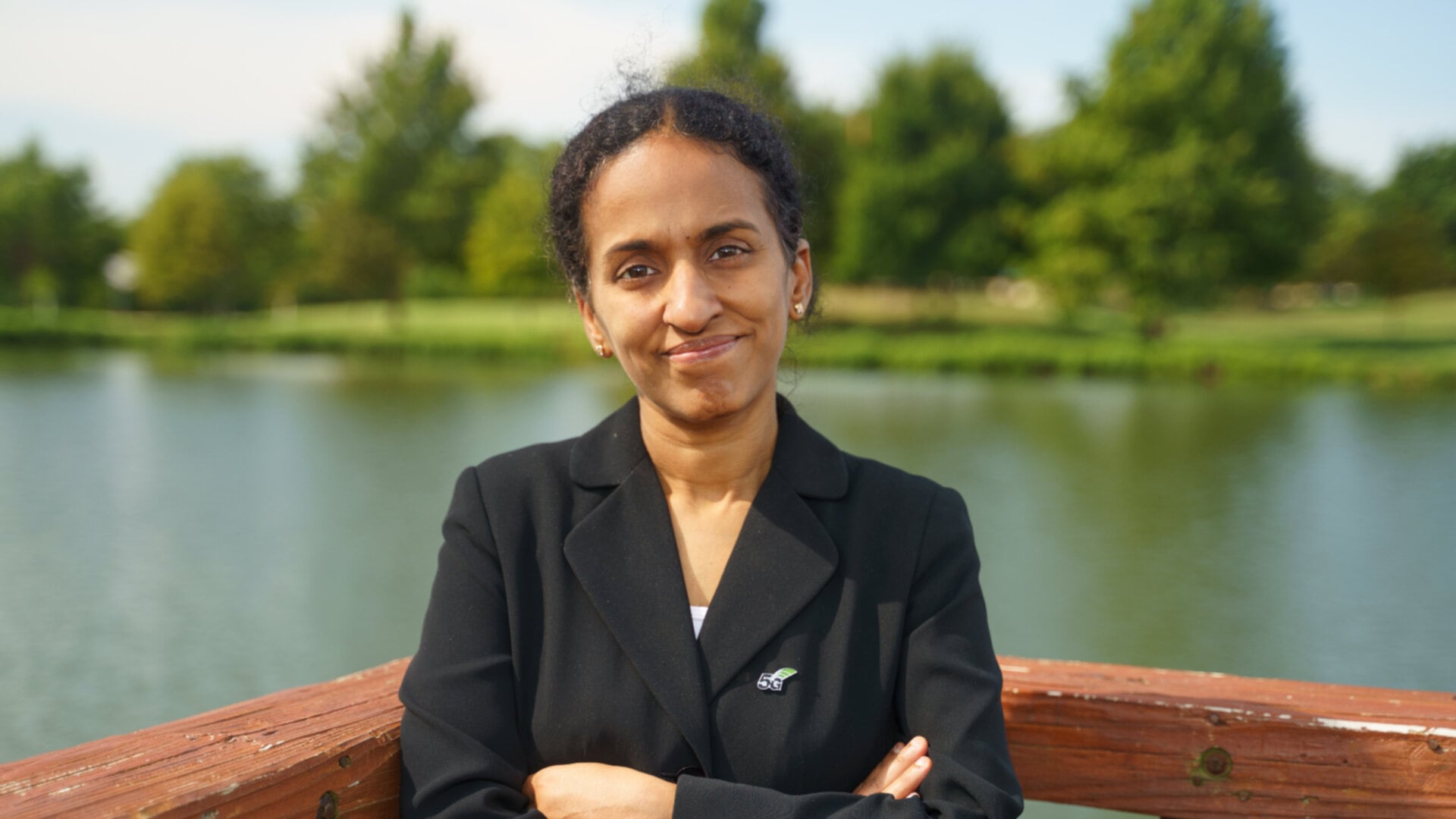Creativity and passion drive Devaki Chandramouli in her standards work

Devaki Chandramouli is known for her ability to navigate the difficult terrain of technology standardization with ease. As the head of North American Standardization at Nokia, Chandramouli sets Nokia’s standards and industry-environment strategy in the region. She also represents Nokia in 3GPP and collaborates with technologists from other companies around the globe to develop system architectures and technical specifications for wireless networks. These technical specifications are fundamental to ensuring that today’s complex telecommunications networks work seamlessly.
Her many contributions to mobile network technologies were instrumental in Chandramouli being named a Nokia Bell Labs Fellow in 2020 and receiving the 3GPP Excellence Award in 2021. Chandramouli was one of seven 2020 Bell Labs Fellows and the only woman awarded this top honor that year. She was one of only four to receive the prestigious 3GPP Excellence Award. The two recognitions are among the highest honors in the technical community, given to those who have made outstanding contributions to the industry.
“I am very humbled and honored,” Chandramouli said. “As an engineer, this was a dream come true.”
“Creating something real”
As a youth, Chandramouli was drawn to math and physics classes and studied computer science engineering as an undergraduate at Madras University in Chennai, India. She continued her education in the US, getting a master’s degree from the University of Texas at Arlington. While attending UTA, she worked on a group project with Nortel Networks and then was hired by the company. She worked in product development at Nortel, which provided her with a deep understanding of product design and network architecture. She also liked the sense of accomplishment that comes with creating a product that gets deployed in a customer network.
“It is nice to create something real and see it working,” she said.
She later joined Nokia and became part of the Technology Innovation Organization, where Chandramouli was able to build on her early learnings at Nortel to develop a deeper understanding of wireless networks. “I longed to be part of creating an end-to-end system that has a huge impact on the industry,” she said.
Being part of Nokia’s standards group allowed Chandramouli to fulfill that dream. However, she admits that while gratifying, the standards process is not an easy one. “It can be a difficult road,” she said. Not only does the work demand technical depth, it also requires negotiating and tactical skills.
On the technical front, Chandramouli has filed for more than 200 patents and has also authored two books — LTE for public safety and 5G for the connected world. These books, along with research papers about 5G architecture she has co-authored, have helped establish Chandramouli as an authority on 5G. She also represents Nokia as co-chair of the Steering Group at the NextG Alliance, which is focused on advancing North American wireless technology leadership and influencing the 6G roadmap.

Standards work means consensus building – and a ton of travel
Perhaps nowhere is Chandramouli’s industry influence felt more than in her work with the 3GPP — the standards body that develops specifications for mobile networks. 3GPP specifications are developed by working groups that are formed by member companies. For every technical problem that has to be solved, member companies present their often wildly differing solutions. Chandramouli’s job is convince them that Nokia’s proposal is the best one.
That process often takes several months, multiple meetings (often at locations all over the world) and lots of negotiations before a consensus is reached. And there is a lot at stake. The goal of the 3GPP is to develop standards that benefit the entire telecom industry, but the outcome may significantly impact the business of companies involved in the negotiations.
However, creating unity is another area where Chandramouli shines. The 3GPP awarded her a 2020 Excellence Award for her leadership on the working group that focused on 5G systems architecture and industrial IoT and praised her for her ability to resolve controversial issues.
Global standards bodies like the 3GPP are historically male dominated. Chandramouli notes that women are not only under-represented in standards work but they are also in the minority at most technology companies.
The telecom industry, however, is trying to change this with initiatives such as the GSMA’s Women4Tech Programme that is focused on increasing the number of women working in the industry. In addition, Nokia is working hard to improve gender equality across the organization. The company closed its gender pay gap and consistently scores high on Bloomberg’s Gender and Equality Index. In its most recent Index, Bloomberg gave Nokia a score of 64.73%.
The company also has partnered with the United Nations Women on a series of pilot projects that encompass everything from using technology to prevent cervical cancer to promoting STEM education for girls.
Chandramouli believes that one of the biggest obstacles for women that want to work in standards is the extensive travel that is required to do the job. “It is logistically very difficult,” she admits.
Before the pandemic struck in 2020, Chandramouli logged around 120,000 miles of air travel per year just to attend these standards-group meetings and other events. The extensive travel is an impediment, and she credits her family and friends with making it possible.
When she first started traveling to these meetings, her son was only six months old. “It was not easy but my passion for the work and the support of my team pulled me through,” she said, adding that her husband was very supportive as were her extended family and friends.
She also occasionally tries to combine her work travel with some family time by having her family join her in exotic locales like Paris after standards meetings. But it isn’t easy as her work travel doesn’t always line up with school breaks. “All the stars have to align to make it work,” she said.
Of course, because of the Covid-19 global pandemic, nearly all standards meetings are currently being held virtually, giving Chandramouli a welcome respite from travel. Once the pandemic is over, however, her busy travel schedule will likely resume. The nature of standards work necessitates face-to-face negotiations, and she welcomes the opportunity of diving back in. Chandramouli embraces the unique opportunity of shaping the future communications system that will play a fundamental role in our lives. Technical standards work is both intellectually stimulating and fulfilling, she said.

“The most gratifying part is that we can make an impact on the technology that is being used by everyone in the world.” That rings especially true today, when the global pandemic has changed the nature of business and the daily routines of billions of people. That makes the tech industry a great place to be in this critical juncture of history. “Technology has played a huge role in keeping people connected in the pandemic,” she said. “This is very gratifying.”
